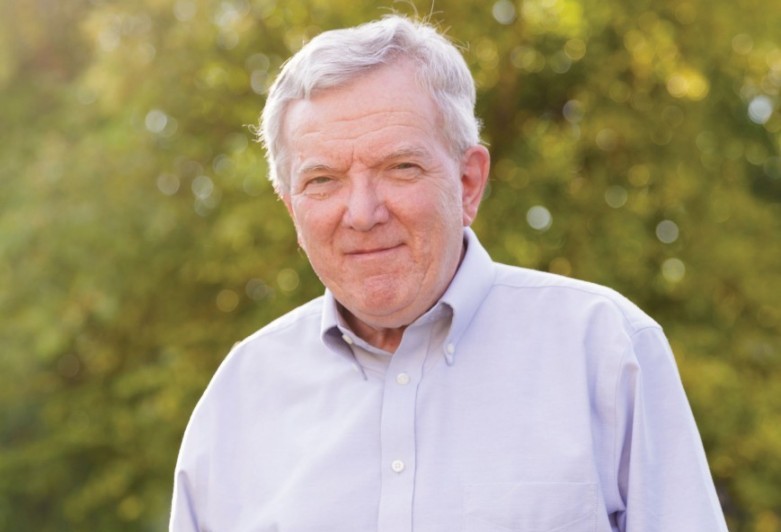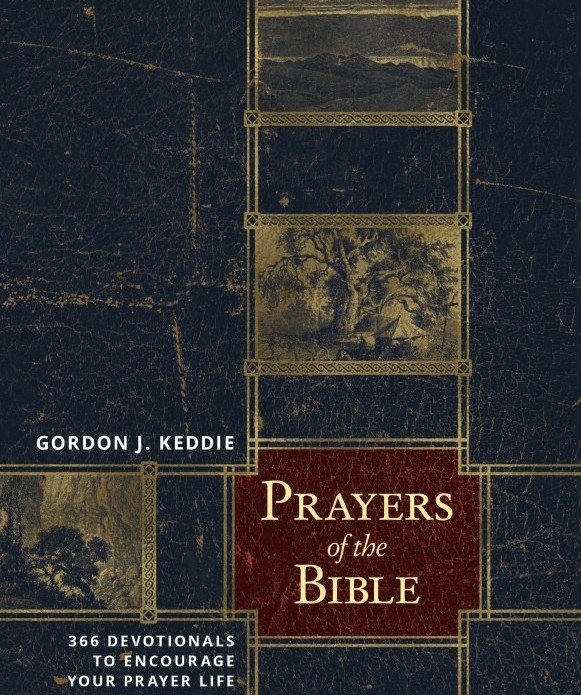You have free articles remaining this month.
Subscribe to the RP Witness for full access to new articles and the complete archives.
In May, I sent the completed manuscript of my recent book, Prayers of the Bible, to our denominational publisher, Crown & Covenant Publications.1 This was a huge relief, as it represented the work of nearly 20 years of meditations on prayer from Genesis to Revelation, mostly given in the first 10 to 15 minutes of midweek prayer meetings. After such study, you would think that I had plenty of prayers, and the Scriptures to inspire them, floating vibrantly around in my memory that I could recall in a moment, whether for times of joy or of sorrow. But, even a couple of weeks after reading the proofs of that manuscript, it was not so.
I Shall Not Die, But Live…In Christ 2
In June, I was rushed to the hospital after coming down with an extreme case of altitude sickness at a Christian conference in Colorado. Relentlessly dizzy and nauseated, I threw up for 21 days in a row, defied all treatment, and showed no improvements. The doctors warned my wife that I might never recover. Food and fluid were pumped into me intravenously, my death was awaited with bated breath, and my life was prayed for by many of God’s people.
One day, early in this ordeal, I tried to pray, but could not think of any words to pray! I knew who I was, where I was, and that I was in bad shape. My memory was like an empty room. I saw a floor, a ceiling, and walls, but they were completely featureless. I could not, try as I did, think of even a single verse of Scripture! Not one.
I scratched around unavailingly for what seemed like ages, when, out of a clear white nothing, some words suddenly appeared, unbidden, in my hollow—and horrified—tabula rasa of a mind:
I shall not die, but live and tell
Jehovah’s power to save;
The Lord has sorely chastened me, But spared me from the grave.
This came to me, not as a discovery spied in an overlooked corner of my memory, nor as some revived memory, but as a surprise and as an unanticipated gift—an answer to an unspoken prayer for some word appropriate to the pressures of the moment. Right away, I was amazed to recognize the words of the metrical version of Psalm 118:17-18, which I had sung many times in church worship from my youth in Scotland to more recent times in the Reformed Presbyterian Church of North America.
What astounded me was the sense that this was so clearly a word from the Lord. This was no new revelation, but both a promise and a prayer in the revealed Word from the covenant God who ministers to His people’s hearts by the indwelling Holy Spirit of truth, adoption (John 16:13; Rom. 8:15). I did not take it exactly as a prophecy that I would survive this illness. I certainly accepted my condition as His chastisement, even for specific sins. But, overwhelmingly, I grasped it as an assurance from the life-giving Savior who, if He could save David from his military enemies, could save me from the challenges of a health crisis. And this I could pray for with the warrant of a hitherto forgotten text of Scripture most fervently believed and a Savior whose love was proffered in this Word.
Then, also suddenly and unbidden, the metrical words of Psalm 118:19 flooded into my soul:
O set ye open unto me
The gates of righteousness;
Then will I enter into them
And I the Lord will bless.
Here is Christ, vouchsafing Himself as the gate of righteousness—“the way, and the truth, and the life” (John 14:6)—of whose person and work the words of the psalmist, about the gates of the temple and the meaning of her sacrifices, are prophetic prefiguring. These words said to me, Look to Jesus your Savior for this promise of life in the face of death, for “He is able to save to the uttermost those who draw near to God through Him, since He always lives to make intercession for them” (Heb. 7:25).
As I thought later on these things, I could not but wonder at the fact that, so recently, I had finished a book on the prayers of the Bible, with a meditation on a prayer for every day of the year, and could not remember one of them!
It was my faithful Savior who chose the Scripture prayer I needed in a moment when my lifetime of memory of that very Scripture had apparently vanished. And all to prove that His love never fails, His promise ever stands, for He who keeps Israel “will neither slumber nor sleep.” When all you who are in Christ are at your most vulnerable, “He will keep your life. The Lord will keep your going out and your coming in from this time forth and forevermore” (Ps. 121:4, 7-8).
I Shall Die, But Live Eternally…With Christ
Shortly after my recovery was underway, the thought occurred to me, “I suppose I’ll have to go through this dying business again.” Lazarus was even resurrected, but is no longer with us (John 11:14, 43; 12:1). I thought, “This time, I have not died, but lived…, but one day, I shall die.” Then came the immediate comfort, “In Christ I have eternal life, and will forever be with Him!”
What, however, is our prayer to be in the face of the actual shortness of what life we have? Surely it is to be found in continuing, with expectant commitment, to seek prayerfully the help of God, both when “desolate and afflicted” and assailed by problems, but also as a way of life in sweet fellowship with the Redeemer of Israel (Ps. 25:16-22). We resort constantly to the promises of the ever-revealed “secret” of the Lord in Christ His Son and our Savior, as, for example, the psalmist does in Psalm 25:14, for “the secret of the Lord is with those who fear Him, and He will show them His covenant.”
Alan Stevenson (1807–65), renowned Scottish lighthouse builder of what is still the largest and most remote of British lighthouses—Skerryvore, on a dangerous reef in the west of Scotland— and uncle of the writer Robert Louis Stevenson (1850–94), lived with a fearfully painful illness that eventually crippled him and shortened his life. He was not only a serious Christian, but also something of a poet. On the flyleaf of the Bible he presented to his son Rob, he points him to the Lord and the secret we all need to know in the face of eternity:
Read in this blessed Book, my gentle boy;
Learn that thy heart is utterly defiled…
This day five years thou numberest; and I
Write on a bed of anguish. O my son,
Seek thy Creator, in thine early youth;
Value thy soul above the world, and shun
The sinner’s way; oh! seek the way of truth.
Oft have we knelt together, gentle boy,
And prayed the Holy Ghost to give us power
To see God reconciled, through Christ, with joy;
Nought else, but Christ brings peace in sorrow’s hour.3
A strange irony in the Lord giving me Psalm 118:17-18 as the immediate focus of my moment of crisis last summer is that it was from a Scripture that does not figure at all in my book on the prayers of the Bible! It is true that, while I included every prayer I could find in all the other books of the Bible, I had to limit my selections from the Book of Psalms4 to those that seemed to me at the time as having particular note as prayers. Psalm 118 is an expression of praise and thanksgiving for mercies already enjoyed and confidently anticipated, rather than a prayer for relief from blessings hitherto denied. Yet verses 17-18 were given to me as the prayer of prayers for my particular, and wholly unanticipated, situation, testing both body and soul. Praise seamlessly becomes a prayer when the Holy Spirit accompanies the Word of God and causes light to shine in the darkness that sometime envelops our hearts in our afflictions—that which gives the light of His glory in the face of Jesus Christ our Savior (2 Cor. 4:6).
Praise God that we who are “in Christ” will never be able to say we “haven’t a prayer”—even if the actual prayers of Scripture have fled from our enfeebled memories for the moment. Meanwhile, “Let your conduct be without covetousness; be content with such things as you have. For He Himself has said, ‘I will never leave you nor forsake you’ ’’ (Heb. 13:5). He is your prayer: “Christ in you, the hope of glory” (Col. 1:27).
Gordon J. Keddie pastored RP congregations in Scotland, Pennsylvania, and Indiana prior to his retirement. He is the author of Prayers of the Bible (2017) and many other books.
-
Published on Nov. 20, 2017, by Crown & Covenant Publications as Prayers of the Bible: 366 Devotionals to Encourage Your Prayer Life. ↩︎
-
In his recent book, The Whole Christ, (p. 45), Sinclair Ferguson searchingly discusses the “default way” of describing believers today. Most commonly, believers are called “believer,” “born-again person,” or “Christian” (each of which is used only two or three times in the New Testament); and maybe “disciple” (a whopping 27 times), when in contrast the expressions “in Christ” (83 times), “in the Lord” (47 times), and “in Him” (66 times in Matthew alone, and vastly more elsewhere in the New Testament) are far more common Scripture usage; and, crucially, refer to the practical experience and impact of actually knowing Christ personally and walking with Him in daily life! ↩︎
-
Bella Bathhurst, The Lighthouse Stevensons, New York: HarperCollins, 1999, p. 198. The reference to seeking the Creator in “early youth” is to Ecclesiastes 12:1, the very text which brought me to Christ as my Savior in Galashiels, Scotland, on May 20, 1962. ↩︎
-
Only Days 88-155 are prayers from the Psalms. The other 298 days are filled with the prayers recorded from Genesis to Revelation. ↩︎

